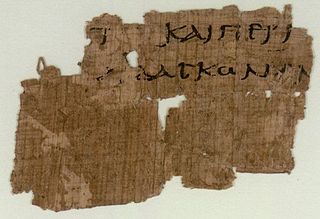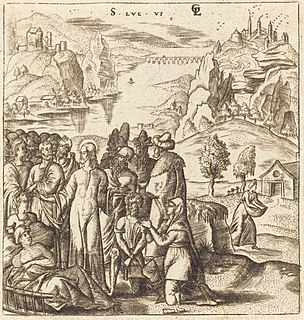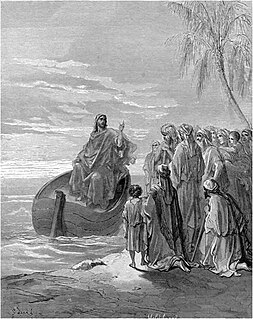Related Research Articles

Matthew 4 is the fourth chapter of the Gospel of Matthew in the New Testament of Christian Bible. Many translations of the gospel and biblical commentaries separate the first section of chapter 4 from the remaining sections, which deal with Jesus' first public preaching and the gathering of his first disciples.

Matthew 4:24 is the twenty-fourth verse of the fourth chapter of the Gospel of Matthew in the New Testament. This verse is part of a brief summary of and introduction to Jesus' ministry in Galilee, which will be recounted in the next several chapters. This verse relates Jesus' fame "throughout all Syria" and summarizes his work of healing.

Matthew 5:1 and Matthew 5:2 are the first two verses of the fifth chapter of the Gospel of Matthew in the New Testament. The verses introduce the Sermon on the Mount that will be recited in the next several chapters. The previous verse mentioned the large crowds "from Galilee, and from the Decapolis, Jerusalem, Judea, and beyond the Jordan" who followed Jesus to witness him healing: these verses present Jesus as seeing the crowds and going up onto a mountain to begin teaching.

Matthew 9:2 is the second verse in the ninth chapter of the Gospel of Matthew in the New Testament.

Matthew 9:1 is the first verse in the ninth chapter of the Gospel of Matthew in the New Testament.
Matthew 9:10 is a verse in the ninth chapter of the Gospel of Matthew in the New Testament.
Matthew 9:28 is a verse in the ninth chapter of the Gospel of Matthew in the New Testament.
Matthew 11:21 is the 21st verse in the eleventh chapter of the Gospel of Matthew in the New Testament.
Matthew 9:34 is a verse in the ninth chapter of the Gospel of Matthew in the New Testament.
Matthew 9:35 is a verse in the ninth chapter of the Gospel of Matthew in the New Testament.

Matthew 8:32 is the 32nd verse in the eighth chapter of the Gospel of Matthew in the New Testament.
Matthew 12:22 is the 22nd verse in the twelfth chapter of the Gospel of Matthew in the New Testament.

Matthew 14:31 is a verse in the fourteenth chapter of the Gospel of Matthew in the New Testament.
Matthew 14:14 is the fourteenth verse in the fourteenth chapter of the Gospel of Matthew in the New Testament.

Matthew 14:25 is a verse in the fourteenth chapter of the Gospel of Matthew in the New Testament.

The miracle of healing the man born blind is one of miracles of Jesus in the Gospels, in which Jesus is believed to have restored the sight of a man at Siloam. Although not named in the gospel, church tradition has ascribed the name Celidonius to the man who was healed. The account is recorded in the ninth chapter of the Gospel of John.
Matthew 11:4-6 is a set of verses in the eleventh chapter of the Gospel of Matthew in the New Testament.
Matthew 12:14-16 is a set of verses in the twelfth chapter of the Gospel of Matthew in the New Testament.

Matthew 13:1-2 are the first two verses in the thirteenth chapter of the Gospel of Matthew in the New Testament.
Matthew 14:15-21 is a set of verses in the fourteenth chapter of the Gospel of Matthew in the New Testament.
References
- ↑ Cornelius Cornelii a Lapide; Thomas Wimberly Mossman The great commentary of Cornelius à Lapide, London: J. Hodges, 1889-1896.
- ↑ John MacEvilly, An Exposition of the Gospel of St. John consisting of an analysis of each chapter and of a Commentary critical, exegetical, doctrinal and moral, Dublin Gill & Son 1879.
- 1 2 3 4 5 6 7 8 9 10 11 "Catena Aurea: commentary on the four Gospels; collected out of the works of the Fathers. Oxford: Parker, 1874. Thomas Aquinas".
 This article incorporates text from this source, which is in the public domain .
This article incorporates text from this source, which is in the public domain .